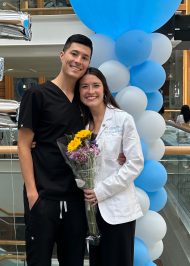Q&A: Excited breastfeeding patients inspire MRT-TI student Jessica Holmes
October 31, 2023
Mary Rose Tully Training Institute (MRT-TI) student Jessica Holmes is a nurse in the Duke University Hospital Birthing Center, where she divides her time on postpartum, high-risk postpartum, antepartum, and labor and delivery. She previously worked in labor and delivery at VCU Health as a CNA. She graduated from Virginia Commonwealth University in 2019 with a BS in Nursing. She, her husband Jesse Woon and their two adopted puppies live in Durham, North Carolina. They enjoy hiking, fly fishing, camping and other outdoor activities.
What led you to MRT-TI and the field of lactation?

Jessica Holmes
I started as a labor and delivery (L&D) nurse in 2017, which has played a huge role. As an L&D nurse, I learned about the physiological aspects of birth from midwives who I admired for how they empowered and always centered our patients and their experiences. Serving as a nurse across multiple hospital systems now has also exposed me to seeing the good, bad and hard things my co-workers experience. I grew a desire to empower patients like the midwives I worked with and learned from. This caused me to transition to postpartum nursing and care. I enjoy validating patients, helping new parents figure out that bond with their new baby, and serving as an advocate and listening ear during such a time of need. I realized how lactation can play a huge role in people’s postpartum experience. Everyone prepares for birth, but few are prepared for postpartum. Lactation is such a source of support and care for this population during this time, and I have worked with some amazing IBCLCs. I like how this program targets the individual experience and brings in a public health focus. It’s more holistic and it’s focused on different areas as opposed to just a clinical perspective. This program allows the opportunity to evaluate the whole system from a wider lens, while also giving the chance to learn and practice clinically.
What are your career goals, and how does becoming an IBCLC contribute to them?
Pregnancy inspires me. Right now, I’m a postpartum nurse and I really enjoy it. I see the desires for my career as a holistic picture that will allow me to interact in all spaces from conception through postpartum, and even further to when the person’s individual birthing journey is over. The strength birthing people have is amazing! I’m not totally sure where my career will take me from here. When I first started, I thought I’d be an L&D nurse for the entirety of my career, and we see how that changed, so who knows? I can say that I always go back to this holistic picture. Wanting to be an IBCLC fits into that frame because it will allow me to contribute to the success of the healthcare system of support for families, along with my nursing role.
What unique qualities are you excited to contribute to the field of lactation?
I think my understanding on a pretty deep level what birth is and what it feels like, and also what postpartum is and what that feels like is a unique perspective I’m excited to contribute. Having a biological, physiological and working understanding of what is happening inside, and working in a population where I help treat these gives me a unique view of the whole field of lactation. I also have a deep understanding of the limitations and areas for growth within this system. I think this will help in terms of my ability to give prenatal education, advocate for parents to begin that goal of exclusive breastfeeding within one hour and help staff around me understand the importance of breastfeeding — exclusively if possible. I understand how the beginning effort and support contribute to the follow through and finish. Having this IBCLC knowledge will help me help parents set realistic expectations and achieve their goals. Also, working only in high-risk L&D and postpartum care, I understand the things that come with high-risk pregnancy and birth experiences, and how that can impact the breastfeeding experience.
“MRT-TI helped me see a global picture of what my field means, especially in terms of breastfeeding.” — Jessica Holmes
Do you want to practice as an IBCLC in a more clinical, research or education role?
This is a hard question. Being in this program makes me want to do it all honestly. I think I want to learn and grow clinically as an IBCLC before I step into research, and especially educating future IBCLCs. We’ve had a couple of classes where we’ve told each other “Hey, there’s your PhD topic,” and that excites me and makes me think I may want to practice in all the ways at some point. MRT-TI does a really good job challenging us by taking us out of our comfort zone and encouraging us to look at lactation and breastfeeding from multiple angles. I’m interested in practicing in all the different ways. I can’t say I won’t eventually try all or do multiple at once, but I can say I’d love to start out in in-patient IBCLC work.
Who inspires you and your work?

(l to r) Jesse Woon and Jessica Holmes at MRT-TI white coat ceremony
I know this may sound cheesy, but genuinely my patients inspire me. I think seeing patients get excited about breastfeeding or cry happy tears breastfeeding or seeing the healing start to take place, seeing them feel stronger or more empowered pushes me to be better, grow more and to find a way to help them. Being in healthcare and public service is a really humbling experience. It’s frustrating that you can’t fix it all. When I encounter those situations, I’m pushed to be better and grow more. Also, coming into this program and hearing everyone’s aspirations and dreams and goals has lit this fire of being more creative, open-minded and ambitious. I remember going home after orientation and telling people about the program. I start crying because it’s so refreshing to be with people who truly do see good and truly are fighting for better.
Where do you see yourself 10 years from now?
I constantly go back and forth between going back to earn my Doctor of Science in Nursing or Master of Science in Nursing to become a women’s health nurse practitioner. The entire dyad and process from preconception to observing the family structure and seeing the dynamic changes really pulls at me and gets me excited.
How has becoming an MRT-TI student impacted your current career?
MRT-TI helped me see a global picture of what my field means, especially in terms of breastfeeding. This has been essential for me because I take care of many people from so many backgrounds and cultures. Having this baseline of understanding that everything in our system of healthcare is so interrelated is essential to becoming a great IBCLC and growing even more in my nursing career.
What do you like to do outside of school and work?
My husband and I have two crazy rescue dogs. We love bringing them on hikes. We also love exploring national parks — it’s a nerdy thing we like doing.
The Mary Rose Tully Training Institute (MRT-TI) is accredited by the Commission on Accreditation of Allied Health Education Programs upon recommendation of the Lactation Education Accreditation and Approval Review Committee. In 2016, MRT-TI earned the distinction of becoming the first accredited Pathway 2 lactation consultant training program in the United States. The program is housed within the Maternal and Child Health department at UNC Chapel Hill’s Gillings School of Global Public Health.
– Brandyn D. Brown-White
